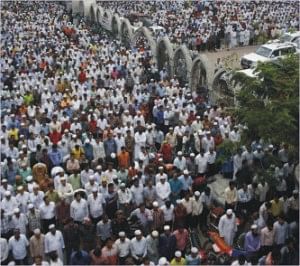A moderate Muslim country!

A country does not have a religion. Photo: Amdadul Huq/ Drik News
MANY western politicians refer to Bangladesh as a moderate "Muslim" country. Some of my British and American friends also think that as a "Muslim" country Bangladesh is more tolerant than many other Muslim populated countries they have been to.
Politicians choose their lexicon for a variety of reasons and intentions, and as ordinary citizens we can hardly do anything to influence their choice of words. For my friends, however, I would beg to differ with their description of Bangladesh. On a few occasions I have asked them how a country could have a religion. A country comprises humans, flora and fauna, and other living beings. Religion is a code of life that only humans adhere to; for the faithful religion is sacred and important, and in Bangladesh people of different faiths have practiced their religions freely for centuries.
Bangladesh is a land where people of many religions have lived close to each other in love and harmony. Before the Sufis began to preach Islam, Hindus and Buddhists far outnumbered the indigenous people of the soil, who had their own faiths too.
In agrarian Bengal people accepted Islam because of its stress on equality for all human beings. In a caste ridden hierarchical society, people of the lower castes converted in order to gain respect and earn recognition in the larger domain. Historians have written extensively on this, and I won't take on the historian's burden of analysing the reasons behind the conversion in Bengal. I am merely interested in asserting that Bengalis have lived with their own identity in pride and dignity even when their land was invaded by foreigners and finally colonised.
During the colonial period, with Calcutta as the capital of undivided India, newer opportunities triggered off competition among the people of Bengal to rise up the ladder. The English language emerged as a tool for those who wanted power and wealth. The peasantry in East Bengal, unfortunately, showed comparatively little interest in getting the best out of a fast transforming society, where the colonisers needed natives to work in different jobs that were inferior to their positions but were nonetheless important for running the administration and doing business.
This lack of enthusiasm was one reason why East Bengal was relegated to a hinterland from where crops and raw materials were supplied to Calcutta. In education, too, people of East Bengal fell behind the inhabitants of West Bengal, who became the forerunners in creating an educated middle-class in the society.
When Bengal was divided in 1905, and Dhaka became its capital, an opportunity opened up for the people of East Bengal to advance economically and socially. However, with the annulment of the division of Bengal in 1911, there were genuine reasons for the people to be aggrieved as they could understand that socio-cultural emancipation would be difficult to achieve as a result of this return to unified Bengal.
It was not until 1921, when Dhaka University was established, that the people of East Bengal got another chance to create a conscious middle-class. Centering on this new university, the people of East Bengal aspired for a future that would help them to improve their standard of living and thinking.
Interestingly, in spite of the bifurcation and subsequent reunification of Bengal, the vast majority of the East Bengali peasantry never veered away from their Bengali identity. The Bengali ethos grew out of a myriad of factors including recognition of the ancient history of pre-Islamic Bengal, a respect for the festivals marking the sowing and harvesting of crops, and faith of the different religious communities -- Muslims, Hindus, Buddhists and Christians.
Much later, after East Bengal was tagged to the state of Pakistan, Dhaka University found itself as the hub of Bengali nationalism based on the linguistic and cultural identity of the people that transcended faith, caste and creed. The language movement in 1952 helped in focusing a clear political vision that culminated in the establishment of secular Bangladesh following the historic war of liberation in 1971.
If my American friend never refers to the US as a Christian country and when my British friend is proud of the UK as a multicultural country, why then should Bangladesh be labeled as a Muslim country? In these days of political correctness in the use of language what can be more politically incorrect? In the developed West, the US is perhaps the most religious country even today, given the large church attendance and the huge number of people who believe in creation instead of evolution. Even then the ultra-right supporters of KKK pride themselves more as white Americans rather than Christians.
The Bengali Hindus, the Bengali Christians, the Bengali Buddhists and the thousands of indigenous Bangladeshis are deeply hurt when their presence is erased by this politically incorrect naming of their country. People of all faiths in Bangladesh are proud of the fact that they belong to the People's Republic of Bangladesh, a secular country that sprouted from the blood of three million martyrs who died for the cause of liberalism, pluralism and tolerance.

 For all latest news, follow The Daily Star's Google News channel.
For all latest news, follow The Daily Star's Google News channel. 



Comments